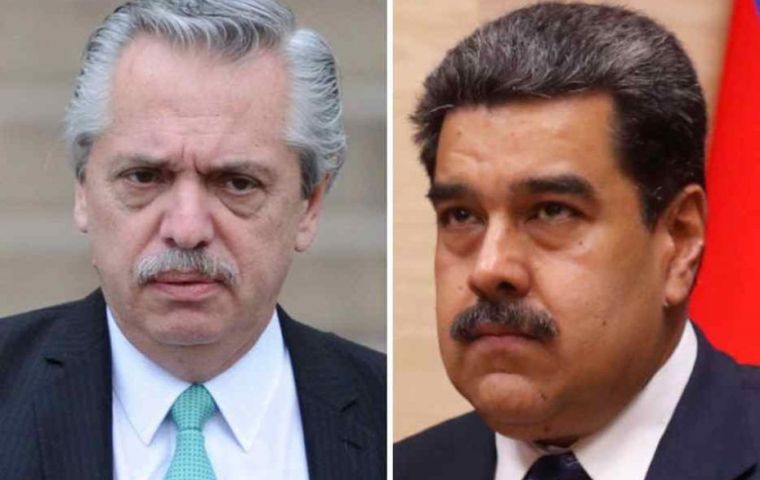MercoPress. South Atlantic News Agency
HRW criticizes Argentine President for his softness regarding Venezuela
 Alberto Fernández's closeness to social welfare movements would seek to appease CFK
Alberto Fernández's closeness to social welfare movements would seek to appease CFK Argentine President Alberto Fernández has been heavily criticized by Human Rights Watch (HRW) for his stance regarding Venezuelan leader Nicolás Maduro and his government's unclear record in that regard.
Fernández had argued that “when I felt that human rights were at risk in Venezuela, I asked the United Nations to investigate, and thank God we voted that way because things in Venezuela have improved a lot, and those denunciations no longer exist.”
HRW Chief Tamara Taraciuk wondered on social media whether Fernández's approach to the Venezuelan question stemmed from “Ignorance or selectivity?” HRW's position was based on documents from the United Nations High Commissioner for Human Rights, the former two-time Chilean President Michelle Bachelet, who has already announced she will not seek another term in office.
Hours before Fernández's statement, Bachelet spoke about an investigation that her team carried out in Venezuela, according to which several “restrictions to the civic and democratic space” had been verified by UN teams to exist in the country.
The former Chilean head of state said she was “concerned” about this situation and detailed that between “March 2021 and April of this year” her team “documented 166 undue restrictions, including stigmatization, criminalization, and threats against dissident voices.”
“My office documented 34 cases of harassment, censorship, and confiscation of media equipment as well as cases of blocking of media websites,” Bachelet added.
Meanwhile, President Fernández's moves are aimed at pleasing Vice President Cristina Fernández de Kirchner (CFK), according to a political analyst in Buenos Aires.
President Fernández visited Milagro Sala in Jujuy (read also: https://en.mercopress.com/2022/06/29/argentine-president-visits-hospitalized-convicted-social-leader ). Then he asked the Supreme Court to reverse Salas' convictions, which the head of state dubbed as “nonsense,” while insisting Salas was a victim of lawfare (a strategy whereby judicial cases are used as a weapon between rivaling political alliances) and suggested a pardon.
“It is obvious that Milagro Sala is a Cristinista leader and that such an approach would be to Cristina Kirchner's liking,” columnist Adrán Ventura wrote on TN while insisting Alberto Fernández was conveying to society the message that “Cristina Kirchner is the main victim of lawfare and the Court should defend her.”
Ventura then raised the question of whether Alberto Fernández would dare to pardon CFK if she is convicted in one of the many cases against her and added that, if it came to be, it “would be a scandal.”
Alberto Fernández would thus be seeking a rapprochement to CFK amid growing rumors in Buenos Aires that hardline Kirchnerites would push for an economic catastrophe that would require Alberto's removal from office and CFK's return to Casa Rosada, all of which brings on deja-vu feelings about times when former Presidents Raúl Alfonsín and Fernándo de la Rúa were forced to early departures. CFK herself was on the brink of reaching that threshold, but the idea of promoting then-Vice President Julio Cobos (of opposition UCR allegiance) kept Peronist crisis mongers at bay.
With inflation growing by the hour and the parity between the Argentine peso and the US dollar out of control in a direction opposite to the one registered in most Latin American countries, anything can happen.




Top Comments
Disclaimer & comment rulesCommenting for this story is now closed.
If you have a Facebook account, become a fan and comment on our Facebook Page!